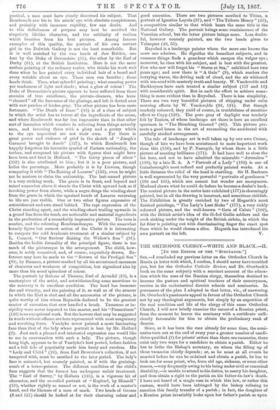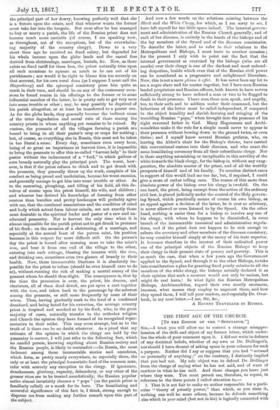THE ORTHODOX CLERGY—WHITE AND BLACK.—IL go THE EDITOR OF THE
" SPECTATOR."] SIR,-I concluded my previous letter on the Orthodox Church in Russia (a letter with which, I confess, I should never have troubled you, but for the Orthodox Catholic Review, and Dr. Overbeck's- book on the same subject) with a succinct account of the educa- tion which the sons of the Russian clergy, themselves destined to become the pastors and spiritual teachers of their countrymen, receive in the ecclesiastical district schools and seminaries. Im pursuance of the plan I adopted in that letter, viz., of answering: Dr. Overbeck's passionate appeal in favour of the Orthodox Church not by any theological arguments, but simply by an exposition or the real condition and life of the clergy of this same Orthodox. Church, I will now briefly examine the career of a Russian priest, from the moment he leaves the seminary with a certificate suffi- ciently favourable for him to obtain the preliminary rank of deacon.
Since, as it has been the case already for some time, the semi- naries turn out at the end of every year a greater number of candi- dates qualified (?) for priests' orders than there are vacancies, there exist only two ways for a candidate to obtain a parish. Either he- has to bribe the Bishop's secretary, on whom the filling up of these vacancies chiefly depends ; or, as he must at all events be married before he can be ordained and obtain a. parish, he has to look out for some priest, who, from old age, sickness, or some other reason, —very frequently owing to his being under civil or canonical disability,—is unable to attend to his duties, to marry his daughter, and thus obtain a right to the parish on his father-in-law's death. I have not heard of a single case in which this law, or rather this custom, would have been infringed by the bishop refusing to sanction this family transfer of a parish ; in fact, the daughter of a Russian priest invariably looks upon her father's parish as upoa the principal part of her dowry, knowing perfectly well that she is a fixture upon the estate, and that whoever wants the former must take her into the bargain. But even after he has managed to buy or marry a parish, the life of the Russian priest does not become much more enviable (of course, I am speaking now, as throughout, not of the exceptions, but of the overwhelm- ing majority of the country clergy). Down to a very short time ago he received no fixed salary, but depended for his whole income upon the glebe lands and the casual fees derived from christenings, marriages, burials, &c. Now, as there exists no fixed tariff for these fees, the priest naturally tries upon all such occasions to squeeze as much as he can out of his parishioners ; nor would it be right to blame him too severely on that account, for his own rural dean (as I suppose I must call the Blagochinny) and the episcopal consistory press him quite as much in their turn, and should he on any of the customary occa- sions be found remiss in his offerings to the former or to some influential member of the latter, he is pretty safe to get very soon into some trouble or other ; nay, he may possibly be deprived of his parish altogether, or at least be transferred to a poorer one. As for the glebe lands, they generally become the indirect cause of the utter degradation and moral ruin of those among the country priests in whom anything yet remains to be ruined. By custom, the peasants of all the villages forming a parish are bound to bring in all their pastor's crop or crops for nothing ; but, of course, as everything else in Russia, this must not be taken in too literal a sense. Every day, sometimes even every hour, being of so great an importance at harvest time, it is impossible to bring the peasants to offer this so-called "harvest help" to their pastor without the inducement of a " feed," in which gallons of corn brandy naturally play the principal part. The worst, how- ever, is that if the priest refuses to drink and to get drunk with the peasants, they generally throw up the work, complain of his conduct as being proud and unchristian, become his worst enemies, and generally manage to get him into some trouble or other. As to the manuring, ploughing, and tilling of his field, all this de- volves of course upon the priest himself, his wife, and children ; and whoever has derived his knowledge of farming from other sources than bucolics and pretty landscapes will probably agree with me, that the continual associations and the condition of mind and body which actual farm labour entails, are not exactly those most desirable in the spiritual leader and pastor of a raw and un- educated peasantry. Nor is harvest the only time when it is almost impossible for the parish priest not to get drunk in presence of his flock; on the occasion of a christening, of a marriage, and especially at the annual feast of the patron saint, his position becomes in this respect far more difficult still. On the patron's day the priest is bound after morning mass to take the saint's icon, and bear it from one end of the village to the other, entering into each cottage, blessing the inmates with the icon, and drinking one, sometimes even two glasses of brandy to their health. Now, these innumerable libations it is absolutely im- possible for the priest to refuse (should he even himself care to do so), without running the risk of making a mortal enemy of the peasant whom he should thus slight. The consequence is, that by the time the procession is over, the priest, his deacon, and choristers, all of them dead drunk, are put upon a cart together with the icon, and taken back to the parsonage by the soberest among the peasants, or still more frequently by some of their wives. Thus, having gradually sunk to the level of a confirmed drunkard, and being hated for his extortion, the average country priest is despised and mocked at by his flock, who, in the great majority of cases, naturally transfer to the orthodox religion and Church the opinion they have formed of its recognized repre- sentative in their midst. This may seem strange, but as to the truth of it there can be no doubt whatever. As a proof that my estimate of the opinion in which the clergy are held by the peasantry is correct, I will just refer to the following fact, which no candid person, knowing anything about Russian society and the Russian people, is likely to contradict :—In Russia, the most indecent among those innumerable stories and anecdotes, which form, as pretty nearly everywhere, so especially there, the only or at least the principal humoristic food of the common man, refer with scarcely any exception to the clergy. If ignorance, drunkenness, gluttony, rapacity, debauchery, or any other of the grosser vices are to be treated anecdotically, the Russian popular satire almost invariably chooses a " pope " (as the parish priest is familiarly called) or a monk for its hero. The humiliating and mournful significance of this fact is, I think, strong enough to dispense me from making any further remark upon this part of the subject.
And now a few words on the relations existing between the Black and the White Clergy, for which, as I am sorry to see, I have left myself far too little space indeed. The internal govern- ment and administration of the Russian Church generally, and of each of her dioceses, is entirely in the hands of the bishops and of the lay members of the Synod and of the diocesan consistories. To describe the latter, and to refer to their relations to the Metropolitans and Bishops, I must leave to another occasion ; for the present I only wish to point out the fact that the internal government as exercised by the bishops (who are all monks) over their clergy is one of the darkest and most unbend- ing despotism, beside which even that of the Russian civil power can be considered as a progressive and enlightened liberalism. Now, this is not a mere phrase a efet. It has never been my lot to see a negro slave and his master together, but I have seen Russian landed proprietors and Russian officers, both known to have nerves sufficiently strong to have ordered a man or two to be flogged to death in their presence. I have seen these men speak, and angrily, too, to their serfs and to soldiers under their command, but the behaviour of the latter must be called independent, if compared to the abject humility and slavish fawning and cringing of the trembling Russian "pope," when brought into the presence of his right reverend father in God. Many Hegoumens and Archi- mandrites make it the rule for a simple monk never to appear in their presence without bowing down to the ground twice, or even thrice ; and I myself know several Russian prelates, who, on leaving the Abbot's chair for the Bishop's throne, have carried this conventional custom into their dioceses, and who exact the same humiliating ceremony from all their subordinate clergy. Nor is there anything astonishing or inexplicable in this servility of the white towards the black clergy, for the bishop is, without any exag- geration, the absolute master of the priest, and of all the worldly prospects of himself and of his family. To mention distinct cases in support of this would lead me too far, but, if required, I could give a score of rather telling ones. The reason of this more than absolute power of the bishop over his clergy is twofold. On the one hand, the priest, being exempt from the action of the ordinary civil law, is placed judicially under the control of the Holy govern- ing Synod, which practically means of course his own bishop, as an appeal against a decision of the latter, be it ever so arbitrary, is never allowed or even listened to by the Synod. On the other hand, nothing is easier than for a bishop to involve any one of his clergy, with whom he happens to be dissatisfied, in some breach of the innumerable canonical and administrative regula- tions, and if the priest does not happen to be rich enough to suborn the secretary and other members of the diocesan consistory, he may consider himself simply at the mercy of his irate superior. It becomes therefore in the interest of their unlimited power one of the principal objects of the Russian Bishops to keep their clergy in their present state of penury and poverty. This is so much the case, that when a few years ago the Government applied to the Synod, and through it to the other Bishops, to take into consideration a plan for granting fixed yearly salaries to all the members of the white clergy, the bishops actually declared it as their opinion that such a measure would not only be useless, but might do real harm ! In what light the Russian Metropolitan Bishops, Archimandrites, regard their own mostly enormous, incomes, what means they employ to augment them, and how they spend them, I will tell your readers, and especially Dr. Over- beck, in my next letter.—I am, Sir, &c., A RECENT TRAVELLER IN RUSSIA.































 Previous page
Previous page